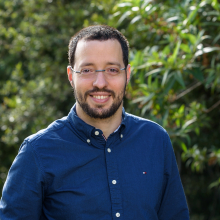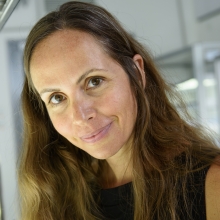Towards better communication
New scientists

What do multi-player online games, computer networks, servers in a data center, ants in a colony, humans in a social network, and neurons in the brain have in common? They all involve a complex tapestry of communication and interaction. To Dr. Merav Parter, a scholar of theoretical computer science, they are all beautiful illustrations of so-called ‘distributed networks’.
Dr. Parter, who recently joined the Department of Computer Science and Applied Mathematics, studies the theory of distributed computing (TDC) and algorithms for understanding the activities within such distributed networks. TDC is a field of computer science that addresses how systems composed of multiple components communicate with each other and coordinate their actions. In distributed systems, many individual entities, each with a partial view of the network, communicate and collaborate towards performing a common computational task for the entire network.
In her research, Dr. Parter aims to develop new tools, techniques, and structural properties to tie together families of computational problems in theoretical computer science. She brings to the Institute her expertise in TDC, and in particular, wireless network topology—that is, the infrastructure that enables computers to connect and interact with each other without a physical or cable connection. Ultimately, she wants to translate TDC into real-world applications, ensuring that wireless networks—for our phones, Internet, and other telecommunication methods—can function better, based on more sophisticated algorithms.
Moreover, she takes inspiration from nature—from ant behavior to neural circuits in the brain—to solve distributed problems faster. “I want to deepen the connections between distributed computing and other areas both within and beyond theory, applying the power of distributed computing to economics, sociology, neuroscience, and animal science,” she says.
Dr. Parter’s path to the Weizmann Institute took unusual turns: she earned her MSc at the Weizmann Institute in the field of bioinformatics, in the lab of Prof. Uri Alon of the Department of Molecular Cell Biology. She then worked as a software engineer for CheckPoint Software Technologies Ltd., one of Israel’s most successful high-tech companies in the field of telecommunications security. But the pull of the academy could not be denied. She returned to Weizmann to earn her PhD in theoretical computer science under the direction of Prof. David Peleg, studying the properties of reception maps in wireless networks, using continuous analysis, linear algebra, and other methods. Her main focus was on methods to eliminate ‘dead zones’ in networks that have sparse communication structure, such as wireless networks in remote or rural locations.
Dr. Parter joined the Institute as faculty member in the very department where she earned her PhD, after completing postdoctoral studies at MIT, which were supported in part by a grant from the Israel National Postdoctoral Program for Advancing Women in Science. She now integrates her knowledge of systems biology and expertise in mobile networks and TDC to chart a path forward. The distributed scientist has come home.
Dr. Merav Parter earned her BSc in bioinformatics summa cum laude from Bar-Ilan University in 2005. She earned her MSc in bioinformatics (2008) and her PhD in computer science (2014) from the Weizmann Institute of Science, under the guidance of Prof. Uri Alon and Prof. David Peleg, respectively, focusing on the topology of wireless communication. Following a brief postdoctoral fellowship with Prof. Peleg, she did a second postdoctoral fellowship at the Massachusetts Institute of Technology. She joined the Weizmann Institute of Science in 2017.
Dr. Parter has received numerous awards both for her research and communication skills, including the Sir Charles Clore Prize (2017); the Israel National Postdoctoral Award for Advancing Women in Science (2015); the Chorafas Prize (2015); a Fulbright postdoctoral fellowship (2015); and the Rothschild postdoctoral fellowship (2015), among many other prizes for academic excellence.








